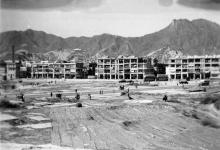Sir David Wilson and the Rose Garden
Primary tabs
Submitted by Andrew Craig-Bennett on Tue, 2010-09-21 13:54
The Hong Kong economy fell off a cliff, overnight. Emigration to Canada, Singapore, wherever, increased massively.
The British decided that they had to do something to restore business confidence in Hong Kong.
I was not in, or anywhere near, the room at the time and I have no idea why it happened, but the Hong Kong Government decided to pull off the shelf a project that had been languishing in a forgotten corner.
You will recall that Kai Tak airport was, to put it mildly, under pressure. The third busiest airport on the globe, but with a single runway, limited apron space, a midnight to 0600 curfew and a "hairy" approach.
A plan for a new airport had been roughed out in the early 80's, but put to one side on grounds of cost. At the same time, the port facilities were groaning under the strain; there were nowhere near enough container terminals even though Hong Kong's terminals were, by several times over, the most productive on the planet, measured by land use, labour, craneage and so on.
I recall that Sir David Wilson pulled this rabbit out of his hat very soon after the June 4th Events - I've just looked it up and I see that he announced it on the 11th October 1989, just four months after the Tian An Men square killings. By that time, the scale of the slump in Hong Kong's economy and the flood of people emigrating were both already apparent.
The Government reckoned that the only way to get Hong Kong's economy going again was by a massive Keynsian exercise in "pump priming" - by flattening a couple of islands, dredging the seabed, building a new railway and road, with the fifth longest suspension bridge in the world as part of the package, and developing a new airport and port.
This project, costed at HK$ 100 billion, was given the charming code name, "The Rose Garden Project".
I was not in, or anywhere near, the room at the time and I have no idea why it happened, but the Hong Kong Government decided to pull off the shelf a project that had been languishing in a forgotten corner.
You will recall that Kai Tak airport was, to put it mildly, under pressure. The third busiest airport on the globe, but with a single runway, limited apron space, a midnight to 0600 curfew and a "hairy" approach.
A plan for a new airport had been roughed out in the early 80's, but put to one side on grounds of cost. At the same time, the port facilities were groaning under the strain; there were nowhere near enough container terminals even though Hong Kong's terminals were, by several times over, the most productive on the planet, measured by land use, labour, craneage and so on.
I recall that Sir David Wilson pulled this rabbit out of his hat very soon after the June 4th Events - I've just looked it up and I see that he announced it on the 11th October 1989, just four months after the Tian An Men square killings. By that time, the scale of the slump in Hong Kong's economy and the flood of people emigrating were both already apparent.
The Government reckoned that the only way to get Hong Kong's economy going again was by a massive Keynsian exercise in "pump priming" - by flattening a couple of islands, dredging the seabed, building a new railway and road, with the fifth longest suspension bridge in the world as part of the package, and developing a new airport and port.
This project, costed at HK$ 100 billion, was given the charming code name, "The Rose Garden Project".
It ended up being forecast at HK$ 200 billion, and came in, after some elements were cut at HK$ 160 billion, or say US$ 21 billion.
In everyday civil servantese, it was "PADS" - the Port and Airport Development Strategy.
It was hugely controversial from the start.
Many people, often British, but often not, said that Hong Kong had got along quite well with Kai Tak; the new airport would be finished just in time for the handover so why bother spending all that money on a present for China?
The PRC government and its many mouthpieces, on the other hand, denounced what they saw as a Cunning Plan by the unspeakable British to circumvent the Joint Declaration and drain the Exchange Fund - Hong Kong's huge foreign reserves - back to Britain, through overcharging on "Rolls-Royced" civil engineering projects, leaving a bankrupt and ruined Hong Kong to the Mainland.
It is worth noting that the reason the project had been shelved is that the Government decided it could not afford it; furthermore, it was very far removed from the ideals of JJ Cowperthwaite, who would certainly have said that if the private sector wanted an airport, it should build one (he famously did say this about the multi-storey car park in Central - which was indeed built by the private sector).
There is, for people of my generation, a crowning irony in seeing the People's Republic commit, over the past year, to an exercise in Keynsian pump priming through infrastructure projects that looks amazingly similar to the Rose Garden Project.

